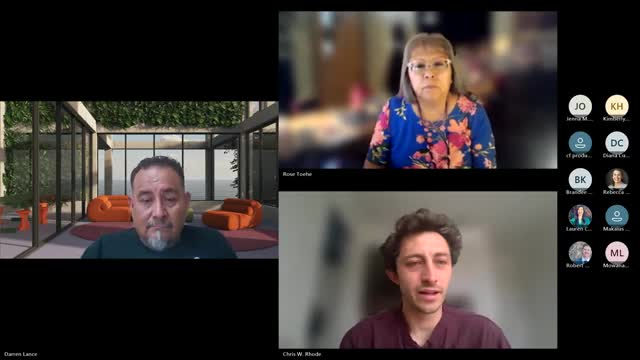City staff summarizes COTA projects: rainbow crosswalk, camping enforcement, oral-history archive
Get AI-powered insights, summaries, and transcripts
Subscribe
Summary
At the Indigenous Commission meeting Aug. 7, 2025, Chris Rohde gave an update on Commission on Diversity Awareness (COTA) projects including a proposed rainbow crosswalk, enforcement changes tied to recent court rulings on public camping, an oral-history archive now hosted by the Arizona Memory Project, and inclusive wayfinding efforts.
Chris Rohde, special programs manager with the City of Flagstaff’s communications and public engagement division and staff liaison to the Commission on Diversity Awareness (COTA), briefed the Indigenous Commission on Aug. 7 on several ongoing and planned COTA initiatives. He told commissioners the city has been working with community partners on a rainbow crosswalk, updating approaches to enforcement of the city’s anti-camping ordinance following recent court developments, continuing an oral-history project now housed by the Arizona Memory Project, and supporting inclusive wayfinding and cultural exhibitions. The rainbow crosswalk effort, Rohde said, began under a previous administration and returned to active work about a year ago with local groups including Flag Pride and the Northern Arizona Queer Coalition participating in a working group. "We do not currently have one anywhere," Rohde said, describing the team’s search for a suitable non-vehicular site such as a plaza or park because, he said, city engineering and legal staff have concerns about installing the crosswalk in vehicle lanes under the Manual on Uniform Traffic Control Devices (MUTCD). Rohde said other cities have proceeded despite the MUTCD issue, and that City Council has the authority to approve an exception. Why this matters: the crosswalk project is framed as both an arts/public-engagement project and a public-safety/legal question because of federal traffic-control standards; any decision will require balancing community requests, legal risk, and maintenance funding. Rohde also summarized COTA’s recent work on the city’s anti-camping ordinance. He reviewed the legal backdrop raised to commissioners: the 2018 Martin v. Boise line of cases that limited criminalization of sleeping in public when no shelter beds are available, and a June 2024 decision in Johnson v. Grants Pass that revamped that approach and affirmed that cities may prohibit camping in public spaces. Rohde said the Flagstaff Police Department has responded by emphasizing services and education rather than arrests. "They do not want to start incarcerating people for this," Rohde said, describing the department’s current emphasis on connecting people to services. He noted the shift in case law arrived as the department took on a new police chief, who has expressed interest in creating a citizen review board to advise the department. Rohde urged commissioners to consider the public-safety implications of camping in and near forested areas given extended stage-2 fire restrictions and the community’s vulnerability to fire incidents. He said COTA has continued meetings with Flagstaff Police Department staff to monitor enforcement approach and community impacts. On cultural work, Rohde described an oral-history project that he said now includes "over 600 recordings" and is being housed in the Arizona Memory Project at the Arizona State Library after earlier coordination with the Flagstaff Public Library. He credited Commissioner Angelica Sanchez as a project lead and encouraged Indigenous Commission participation. "They are looking for ways to get this information into exhibits and events where it can be shown off more," Rohde said. Other items Rohde covered included an inclusive wayfinding pilot presented by the Downtown Business Alliance that favors indigenous languages and symbols as primary elements for downtown signs; COTA’s participation in a multicultural county parks cultural exhibition; and a push to improve collaboration with community groups when drafting proclamations so that local organizations can present to City Council when proclamations are read. Commissioners asked questions about the oral-history project’s tribal representation and access; Rohde said the collection is "pretty comprehensive" but that he did not have a tribe-by-tribe breakdown and recommended contacting library project staff or COTA commissioner leads for detail. Commissioners also suggested using QR codes and digital story maps to expand space available for interpretation on signs. The presentation concluded with Rohde noting he is preparing to transition out of his current role in a few months and encouraging commissioners to build institutional relationships to sustain projects.
